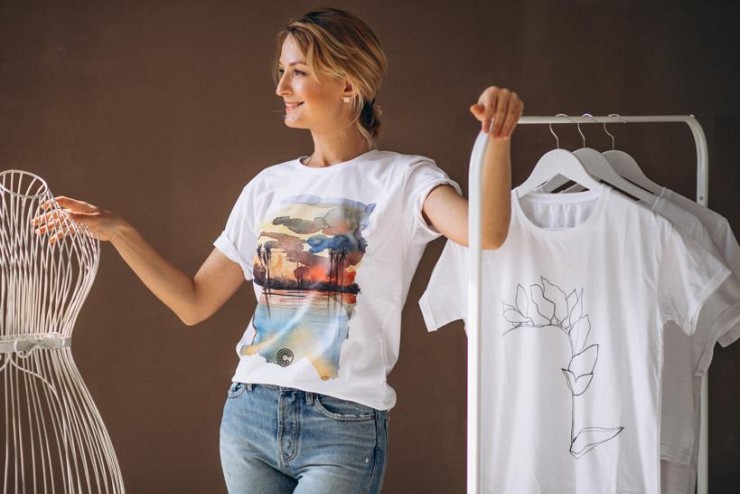The Ultimate Guide to Choosing the Right T-Shirt Fabric
Posted on 06 November 2024

When designing perfect custom t-shirts, the choice of fabric can make or break your project. Whether you're ordering team uniforms, promotional merch, or branded workwear, understanding different t-shirt fabrics is essential to achieving your desired results. In this comprehensive guide, we'll walk you through everything you need to know about t-shirt materials to help you make an informed decision for your next custom apparel order.
Understanding Cotton: The Classic Choice
Cotton remains the most popular t-shirt fabric choice, and for good reason. This natural fibre offers unmatched breathability and comfort, making it ideal for everyday wear. Pure cotton shirts are particularly well-suited for screen printing, as the natural fibres readily absorb ink, resulting in vibrant, long-lasting designs.
The quality of cotton t-shirts largely depends on the length of the cotton fibres used. Premium options like Pima or Egyptian cotton feature extra-long fibres, creating exceptionally soft and durable garments. While these premium versions come with a higher price tag, they offer superior comfort and longevity that can justify the investment for high-end promotional wear or retail applications.
Standard cotton, while more economical, still provides excellent value for most custom apparel projects. However, it's important to note that 100% cotton shirts may shrink slightly after washing and can wrinkle more easily than blended fabrics. They also tend to retain moisture, which might not be ideal for athletic or high-performance applications.
The Rise of Cotton/Polyester Blends
Cotton/polyester blends have revolutionized the t-shirt industry by combining the best qualities of both materials. The most common ratio is 50/50, though variations like 60/40 or 65/35 are also popular. These blends offer several advantages over pure cotton: they resist shrinking and wrinkles better, dry faster, and maintain their shape through repeated washings.
When you design custom t-shirts, blended fabrics provide excellent versatility. They accept both screen printing and embroidery well, though the higher polyester content can sometimes require special inks for optimal results. The addition of polyester also makes these shirts more durable and less prone to fading, making them excellent choices for workwear or frequently worn uniforms.
Performance Fabrics: Beyond the Basics
The evolution of synthetic fabrics has given rise to a new category of performance t-shirts. These garments, typically made from specialized polyester or polyester blends, incorporate moisture-wicking technology that pulls sweat away from the body and promotes rapid evaporation. This makes them ideal for athletic wear, outdoor events, or any situation where temperature regulation is important.
Modern performance fabrics often include additional features like UV protection, antimicrobial properties, and stretch components for enhanced comfort. While these shirts generally come at a higher price point, they offer unmatched functionality for activewear applications. When it comes to customization, performance fabrics work well with both screen printing and embroidery, though they require specific techniques and inks to ensure optimal results.

Tri-Blend: The Premium Feel
Tri-blend fabrics, typically composed of cotton, polyester, and rayon, represent the luxury end of t-shirt materials. These shirts offer an exceptionally soft feel and elegant drape that sets them apart from standard options. The addition of rayon provides increased breathability and a unique texture that many consider superior to traditional cotton or cotton/polyester blends.
While tri-blend shirts excel in comfort and appearance, they require special consideration for customization. The complex fibre mixture can sometimes present challenges for less experienced screen printing companies, and certain designs may not appear as vibrant as they would on simpler fabrics. However, for projects where comfort and style are top priorities, tri-blends remain an excellent choice.
Specialty Fabrics and Sustainable Options
The t-shirt industry has seen significant innovation in recent years, particularly in sustainable and eco-friendly options. Organic cotton, recycled polyester, and bamboo t-shirts offer environmentally conscious alternatives without compromising on quality or performance. These materials often appeal to environmentally aware consumers and can add value to your branded merchandise.
Bamboo-derived fabrics, for instance, offer natural moisture-wicking properties and antimicrobial characteristics. Hemp-based materials provide exceptional durability and become softer with each wash. While these specialty fabrics might require specific decoration techniques, they can help your brand stand out while supporting sustainable practices.
Making the Right Choice for Your Project
Selecting the ideal t-shirt fabric depends on several key factors: intended use, budget, decoration method, and target audience. For standard promotional wear or events, a quality cotton or cotton/polyester blend usually provides the best balance of cost and performance. Athletic programs might benefit more from performance fabrics, while high-end retail or premium promotional items might warrant the luxury of tri-blends or specialty sustainable materials.
Consider also the care and maintenance requirements of your t-shirt fabric. Will these shirts need to withstand frequent washing and wear? Are they for a one-time event or long-term use? Understanding these factors will help guide your choice of material and ensure satisfaction with the final product.
The Importance of Sampling
Before committing to a large order, it's always advisable to request samples of different fabric options. Physical samples allow you to evaluate the weight, texture, and drape of the material firsthand. They also provide an opportunity to test how your chosen design method works with the fabric and ensure the final product meets your expectations.
Remember that different brands may use slightly different materials and construction methods, even within the same fabric category. Working with an experienced custom apparel provider like R&P Prints can help you navigate these nuances and select the perfect shirt for your specific needs.
Final Thoughts
The world of t-shirt fabrics continues to evolve, with new materials and blends regularly entering the market. While this variety provides excellent options for every application, it also makes careful consideration of your choices more important than ever.
By understanding the characteristics of different materials and matching them to your specific needs, you can ensure your custom apparel project achieves its intended impact while providing the comfort and durability your audience expects.
